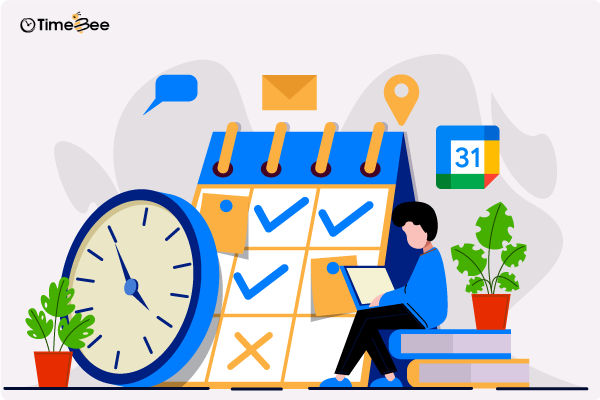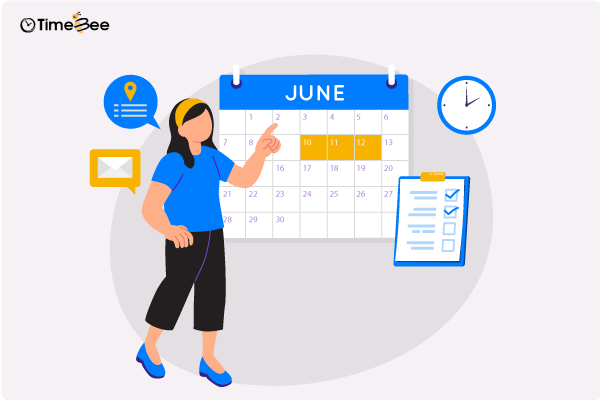Content
Content
It is common to feel inadequate about time when working. There are so many factors that demand our time, and even more, that chip it away. If you often feel that time is slipping away without getting much done, you’re not alone.
When your concern regarding time exceeds a normal limit, it can turn into time anxiety.
What is Time Anxiety?

Time anxiety or chronophobia is a phenomenon most people experience at home or work. Simply put, it’s the fear of time.
It occurs when a person constantly worries about not having enough time to complete tasks. Simultaneously, it fosters doubt about not utilizing your time in the best possible way.
Time anxiety is part of the Generalized Anxiety Disorders (GAD), affecting 19.1% of the adult population in the US as of 2022. Anyone can fall prey to it, but entrepreneurs and working professionals are the most common targets. This is because they have to wear multiple hats and handle seemingly unlimited tasks each day.
Time anxiety can manifest itself in three ways:
- Daytime anxiety: feeling rushed and stressed during the workday
- Future anxiety: constantly worrying about future events
- Existential anxiety: feeling like life is rapidly passing, and you have no control over it
What are the Symptoms of Time Anxiety?
Since we’ve established what it is, let’s now let us go over how time anxiety may feel like:
- Struggling to keep up with your daily tasks because you constantly feel out of time
- Being stuck in a decision-making limbo and procrastination
- Refusing to take breaks or leaves because you can’t ‘afford to’
- Blaming yourself for unfinished tasks and falling behind schedules
- Fear of being late to meetings and appointments
- Always rushing through tasks to compensate for tardiness or insufficient time
- Fear of missing out on opportunities and comparing your milestones to others
To nip time anxiety at its base, start working backward to find what caused it in the first place.
Causes of Time Anxiety

As with any type of anxiety, identifying the triggers is the first logical step to managing it. Time anxiety can look different for everyone.
Here are some factors that may resonate with you:
1. Poor Accountability of Time
Ironically, most of our time goes unaccounted for. According to a 2022 survey, a shocking 82% of professionals don’t have a time management system. This means they don’t have a good idea of where their day goes.
If you’re clueless about how much time you dedicate to which task, there’s a good chance you feel out of control. You may be frazzled about where the day went when you’re not clear about your job description. Having your schedule and tasks laid out in front of you can give you clear insights into your productivity.
2. Unclear Priorities
When you’re uncertain about your goals, you may lack direction. Working each day robotically without a sense of purpose can create existential dread.
This can translate into you working haphazardly. Finding purpose and meaning in your efforts can help counter this. This will also ultimately motivate you to chase your goals and priorities.
3. You’re Often Distracted
Today, we are surrounded by countless sources of distractions. An average person gets interrupted every 5 to 15 minutes per day. Your chatty coworker, the confused intern, phone notifications- everything comes into play. Thanks to these ‘quick’ disruptions, you lose precious time and possibly your focus.
Constant distractions can end up affecting your productivity. Even the best-laid plans can fail if you don’t manage distractions.
4. People Pleasing Behavior
It might go against the ‘hustle culture’, but you need to set healthy work boundaries. Employees may find themselves overladen with work to impress their managers.
Trying to fit in added chores in an already tight schedule often backfires. You may find yourself juggling tasks, competing against time, and trying to tick every box.
Sounds exhausting? It surely is.
5. Comparison
We’ve all heard the saying: ‘comparison is the thief of joy.’ It is particularly relevant to anxiety that is triggered by comparing work performances.
Making assumptions about people’s success based on numbers alone might be naive. When comparing outputs, you may blame yourself for having poor time management or a lack of talent. Yet, the person you compare yourself to might have the same struggles.
Often, people overcompensate for tardiness by working to an extreme. But that is likely to misfire and worsen their stress.
6. Underlying Health Condition
Sometimes, there may be genetic or undiagnosed health factors triggering your anxiety at work.
Individuals with GAD frequently encounter feelings of paranoia and find it challenging to stay focused. When these worries become associated with time, they may translate into time-related anxiety.
For example, a person with social anxiety may struggle with time anxiety, thinking others might judge them on their job performance. Similarly, those who are easily overwhelmed by external stressors may be easily bothered by time restraints at work.
How to Overcome Time Anxiety
In reality, you may not be able to eliminate anxious thoughts completely. And that’s okay because they’re perfectly normal. The first step is to accept that you cannot control time; you can simply manage it.
We’ve established that time anxiety may have varying degrees in individuals. Some people may find it crippling enough to be rendered unproductive. This is where serious intervention is needed.
To help you cope with time anxiety in everyday life, here are some top tips:
I. Practice Mindfulness

Mindfulness is another way of living in the present. By staying hyper-alert to your current state, you can silence your inner thoughts. Being grounded can prevent you from spiraling into existential anxiety.
Practice mindfulness by focusing on your environment. Observe your surroundings and analyze the sounds and colors. Follow a breathing rhythm, constantly reminding yourself of where you are. By choosing the present moment over the past or future, you may better appreciate your life.
II. Plan & Prioritize Your Schedule

If you want to take better control of time, plan ahead. Understanding that you cannot do everything at once, so you must prioritize your tasks. Identify which tasks need your utmost attention and dedicate the most time to them.
An excellent tool for prioritizing work is Stephen Covey’s Time Management Matrix. The model classifies tasks in terms of urgency and importance. By prioritizing tasks this way, you can decide how and when to deal with them. For example, tasks in quadrant 1 need to be done before everything else.
Creating a daily to-do list can help you stay focused throughout the day. It can boost your productivity by motivating you to get more done. Ticking items off your list can be super satisfying and relieve your time anxiety.
III. Set Work Boundaries

Earlier, we discussed how constantly ‘helping’ others can backfire. When you consistently prioritize assisting others over your goals, you may fail to achieve them.
Setting your priorities and communicating them to others is one way. Sharing your schedule with others will communicate your availability to them. This would allow you to politely decline requests that rob your time or are beyond your capacity.
IV. Set S.M.A.R.T Goals

Goal setting should be a methodical process rather than intuitive. SMART goals can put you on a logical path to achieving goals.
Having goals that seem attainable, realistic, specific, and time-bound can reduce the stress surrounding your goals.
V. Limit Distractions

Minimize interruptions by turning off notifications on phones and apps during busy periods. Steering clear of time-wasting activities can help you stick to schedule.
You can also decrease well-meaning interruptions from your team by sharing your busy schedule through a calendar app. Also, set your status as ‘busy’ on messenger apps to avoid being contacted during periods of high concentration.
We also recommend using time-monitoring apps to identify unproductive periods in your day and deal with their causes.
Are You Guilty of being Easily Distracted?
Install TimeBee Today to Fire-up Your productivity
VI. Avoid Multitasking

Multitasking is often labeled as a useful skill, but it can backfire during busy periods. Handling multiple tasks simultaneously can undermine your focus.
Concentrate on one task at a time, tuning out of all distractions and stimuli. Giving your undivided attention can shorten the completion time, reducing stress regarding deadlines.
VII. Leverage Time Management Tools

Using sophisticated time management software can target most of your time-related concerns. These tools are loaded with features that track, catalog, and manage your entire workday for you. Here are our favorite ones:
a. Project Management:
Employees can use these tools to break their work into smaller, more manageable tasks. By organizing and prioritizing tasks, they can achieve clarity on their responsibilities. This can ease the overwhelming fear of being burdened with too much work.
b. Time-tracking
Use time-monitoring tools to oversee your time allocation. For example, use timesheets to track various tasks or project durations. Time-tracking can be a game-changer in improving your time management skills. Being accountable for your own time can boost efficiency and foster self-improvement.
Time tracking can be very accurate in project estimations. By analyzing such information, both employees and managers can spot trends, predict bottlenecks, and recognize time-intensive tasks. Such insights empower employees to plan their time better to avoid surprises.
Additionally, these apps can issue distraction notifications if they detect prolonged inactivity. This can prevent those with short attention spans from wandering off and wasting time.
c. Communication & Collaboration:
Finally, using automated communication tools can help everyone stay aligned and informed. Communicating time-sensitive information can be a deal-maker in some businesses. Having a collaboration platform that’s open to communication can prevent you from hitting speed bumps. Sharing timely feedback and tracking progress to stay on schedule.
Beat Your Time Anxiety
Dealing with time anxiety may feel overwhelming, but it’s manageable with effective tools and strategies. If you experience anxiety related to time, take time to pinpoint the underlying reasons behind it. Once you’ve identified the triggers, start applying the strategies mentioned above to overcome stress.
Understanding the purpose of your efforts can help you effectively manage your uncertainties. Align your everyday tasks with time-relevant goals. Then, create a time management system that helps you work towards these goals.
Navigating time anxiety can be an isolating experience. Don’t hesitate to shout for help and support. If your fear seems out of hand, we strongly advise you to seek professional help.
As time is a valuable resource, we suggest trying out TimeBee to manage it. With its state-of-the-art features, TimeBee can be a problem-solving tool for your time-related issues. Combine it with our other recommendations to beat time anxiety.
Beat Your Time Anxiety
Get TimeBee
Similar Reading



